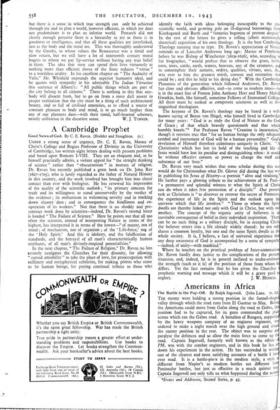A Cambridge Prophet
Good News of God. By C. E. Raven. (Hodder and Stoughton. 5s.)
UNDER a strong sense of urgency, Dr. C. E. Raven,, Master of Christ's College and Regius Professor of Divinity in the University of Cambridgz, has written eight letters dealing with present problems and based upon Romans I-VIII. They are an eloquent and, as he himself practically admits, a violent appeal for "the straight thinking of science" rather than " obscurantism " in matters of religion. Dr. Raven has recently published a great book on Dr. John Ray (1627-1705), who is justly regarded as the father of Natural History in this country, and the work involved has brought him into closer contact than ever with biologists. He has renewed his impression of the quality of the scientific outlook ; "its primary concern for truth and its willingness to stand unreservedly by the verdict of the evidence ; its enthusiasm in welcoming novelty and in tracking down elusory 'data; and in consequence the kindliness and co- operation of its workers." Not that there is no shoddy and pre- tentious work done by scientists—indeed, Dr. Raven's second letter is headed "The Failure of Science." Here he points out that all too often the scientist, instead of interpreting Nature in terms of the highest, has interpreted it in terms of the lowest—" of matter, not of mind ; of mechanism' not of organism ; of the 'Life-force,' no: of the 'Holy Spirit.' And this is idolatry, and the falsification of standards, and the betrayal of all man's characteristically human attributes, of all man's divinely-inspired potentialities!'
In the next chapter, "The Failure of Religion," Dr. Raven no less severely castigates the Churches for their disunity, for allowing "cursed amiability" to take the place of love, for preoccupation with millinery and metaphysical subtleties, for making priests who cease to be human beings, for paying continual tribute to those who
identify the faith with ideas belonging inescapably to the pre scientific world, and growing pale on ill-digested borrowings from Kierkegaard and Barth and "fantasies begotten of present despair.' In the rest of the letters he gives a telling (albeit occasionally theatrical) exposition of his own theology. It is the best Cambridge Theology running true to type. Dr. Raven's appreciation of Nature reminds us of Lancelot Andrewes long ago : Master of Pembroke before he was Bishop of Winchester (1619-1626), who, according t his biographer, "would profess that to observe the grass, herbs corn, trees, cattle,, earth, waters, heavens, any of the creatures, an to contemplate their natures, orders, qualities, virtues, uses, &c.1 was ever to him the greatest mirth, content and recreation that could be ; and this he held to his dying day." With the Cambridge Platonists of the generation which followed Andrewes, Dr. Raven has close and obvious affinities, and—to come to modern times—he is in the exact line of Fenton John Anthony Hort and Henry Melvill Gwatkin, both, like himself, sometime Fellows of Emmanuel College. All three must be ranked as competent scientists as well as dis- tinguished theologians.
The keynote of Dr. Raven's theology may be heard in a well- known saying of Baron von Hugel, who himself lived in Cambridge for many years : God is as truly the God of Nature as the God of Grace • of that which bravely questioneth and that which humbly kneels!'* For Professor Raven "Creation is incarnation, though it remains true that "for us human beings the only adequat symbol and instrument of God will be a human personality." God' revelation of Himself therefore culminates uniquely in Christ. " Christianity which has lost its hold of the teaching and life o Jesus would have lost its peculiar and distinguishing ethos : it woul be without effective content or power to change the stuff an substance of our lives."
Dr. Raven very much wishes that some scholar during this wa would rib for Christendom what Dr. Glover did during the last wa in publishing his Jesus of History—a portrait "alive and vitalising.' He further pays a glowing tribute to the achievement of St. Paul "a permanent and splendid witness cc, what the Spirit of Chris can do when it takes free possession of a disciple." -Our presen task as Christians is "to discover or recover the secret of Pentecost the experience of life in the Spirit and the outlook upon th universe which that life involves." "Those in whom the Spin dwells are thereby linked not only with God in Christ, but with on another. The concept of the organic unity of believers is inevitable consequence of belief in their individual inspiration. Ther can be no such thing as a solitary disciple, for in accepting Chris the believer enters into a life, already, widely shared : he not onl shares a common loyalty, but one and the same Spirit dwells in th whole society. It is, I believe, a fact of universal eicperience tha any deep awarenesS of God is accompanied by .a sense of sympath
—indeed, of unity—with mankind." - Where he touches on the practical problem of Inter-cominunio Dr. Raven hardly does justice to the -complications of the presto situation, and, indeed, he is in general inclined to under-estimat the strength (such as it is) of the- position of those from whom h differs. Yet the- fact remains that he has given the Churches prophetic warning and message which it will be a grave peril t


























 Previous page
Previous page